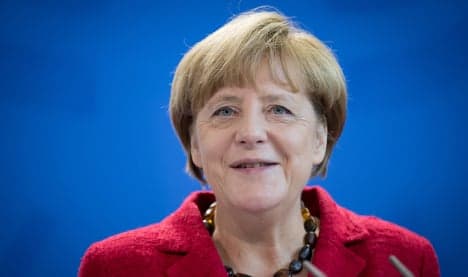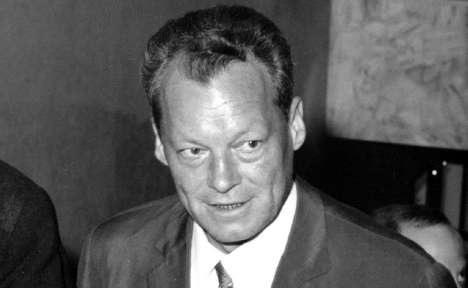Could Merkel win the Nobel Peace Prize?

Angela Merkel is emerging as a favourite to win the Nobel Peace Prize given her work to open Germany up to nearly one million refugees this year alone, according to some peace activists. But does the German Chancellor have what it takes to make the cut?
Merkel has been named by a top Norwegian peace research centre as a frontrunner for this year's Nobel Peace Prize to be announced on Friday.
Director of the Peace Research Institute Oslo (Prio) Kristian Berg Harpviken slated Merkel in the top slot for his predictions for who will win the prize, praising the Chancellor's response to the refugee crisis sweeping Europe.
"In a time when many have dodged responsibility, Merkel has shown true leadership and risen above politics, taking a humane approach in a difficult situation," Prio wrote in a statement announcing Harpviken's shortlist.
Still, Harpviken has yet to correctly predict a winner since he became head of Prio in 2009.
"Merkel may perhaps not qualify as an altruistic Mother Theresa, and her stance has toughened in recent weeks, but a collective European response to the current situation and handling of migrants and refugees in the future, is unthinkable without Merkel at the helm."
Merkel has also been plugged as a top contender by Bloomberg, The Guardian and right-wing German tabloid Bild, which also touted her work to facilitate conversations between Russia and Ukraine in the ongoing conflict.
Germany has taken in by far the greatest number of refugees across the EU, with nearly a million expected to have arrived in the country by the end of the year.
While her open-arms response and push to get other countries involved in sheltering more refugees has garnered her accolades, Merkel has also been fiercely criticized from both left and right - those who say she has not done enough to care for asylum seekers, and those who say she has done too much.
As Prio noted, Germany has also tightened its regulations recently, imposing border controls and implementing a policy where asylum seekers from the western Balkans are deported more swiftly.
The growing number of refugees has intensified tensions among the far right as refugees and their homes have repeatedly been attacked and xenophobic groups like anti-Islam Pegida ("Patriotic Europeans Against the Islamization of the West") have seen an increase in supporters.
Overall confidence in Germany's ability to tackle the refugee crisis has been slipping, with a poll last week revealing that a majority of Germans were worried about the large number of refugees and four-fifths of respondents in another survey on Monday saying they were in favour of border controls.
Approval of Merkel herself has also fallen amid the crisis, according to a poll last month.
The last German leader to win the Nobel Peace Prize was former Chancellor Willy Brandt in 1971 for his work to improve relations between West and East Germany, as well as with Poland and the Soviet Union, during the Cold War.
 Social Democrat Willy Brandt was Chancellor of west Germany from 1969 to 1974. Photo: DPA
Merkel's Peace Prize competition
Other top contenders for this year's prize according to Harpviken's shortlist are Columbian President Juan Manuel Santos and Timoleón Jiménez, leader of the FARC rebels - named at second place for their cooperation in drafting a peace agreement after decades of armed conflict.
Third on the list is editor Dmitry Muratov with his newspaper Novaya Gazeta, which have both held onto "the principles of journalism" at a time when "the space for independent media continues to be shrinking in Russia," Prio wrote.
The Article 9 Association in Japan is at fourth place on the list for its work to campaign against the country's recent moves to expand the mandate the military - an armed force that has stayed out of war for the past 70 years.
The group named as the fifth most likely Peace Prize winners are a trio from the Democratic Republic of the Congo, who have worked for years to help survivors of sexual violence: Jeanne Nacatche Banyere, Jeannette Kahindo Bindu and Dr. Denis Mukwege.
Social Democrat Willy Brandt was Chancellor of west Germany from 1969 to 1974. Photo: DPA
Merkel's Peace Prize competition
Other top contenders for this year's prize according to Harpviken's shortlist are Columbian President Juan Manuel Santos and Timoleón Jiménez, leader of the FARC rebels - named at second place for their cooperation in drafting a peace agreement after decades of armed conflict.
Third on the list is editor Dmitry Muratov with his newspaper Novaya Gazeta, which have both held onto "the principles of journalism" at a time when "the space for independent media continues to be shrinking in Russia," Prio wrote.
The Article 9 Association in Japan is at fourth place on the list for its work to campaign against the country's recent moves to expand the mandate the military - an armed force that has stayed out of war for the past 70 years.
The group named as the fifth most likely Peace Prize winners are a trio from the Democratic Republic of the Congo, who have worked for years to help survivors of sexual violence: Jeanne Nacatche Banyere, Jeannette Kahindo Bindu and Dr. Denis Mukwege.
Comments
See Also
Merkel has been named by a top Norwegian peace research centre as a frontrunner for this year's Nobel Peace Prize to be announced on Friday.
Director of the Peace Research Institute Oslo (Prio) Kristian Berg Harpviken slated Merkel in the top slot for his predictions for who will win the prize, praising the Chancellor's response to the refugee crisis sweeping Europe.
"In a time when many have dodged responsibility, Merkel has shown true leadership and risen above politics, taking a humane approach in a difficult situation," Prio wrote in a statement announcing Harpviken's shortlist.
Still, Harpviken has yet to correctly predict a winner since he became head of Prio in 2009.
"Merkel may perhaps not qualify as an altruistic Mother Theresa, and her stance has toughened in recent weeks, but a collective European response to the current situation and handling of migrants and refugees in the future, is unthinkable without Merkel at the helm."
Merkel has also been plugged as a top contender by Bloomberg, The Guardian and right-wing German tabloid Bild, which also touted her work to facilitate conversations between Russia and Ukraine in the ongoing conflict.
Germany has taken in by far the greatest number of refugees across the EU, with nearly a million expected to have arrived in the country by the end of the year.
While her open-arms response and push to get other countries involved in sheltering more refugees has garnered her accolades, Merkel has also been fiercely criticized from both left and right - those who say she has not done enough to care for asylum seekers, and those who say she has done too much.
As Prio noted, Germany has also tightened its regulations recently, imposing border controls and implementing a policy where asylum seekers from the western Balkans are deported more swiftly.
The growing number of refugees has intensified tensions among the far right as refugees and their homes have repeatedly been attacked and xenophobic groups like anti-Islam Pegida ("Patriotic Europeans Against the Islamization of the West") have seen an increase in supporters.
Overall confidence in Germany's ability to tackle the refugee crisis has been slipping, with a poll last week revealing that a majority of Germans were worried about the large number of refugees and four-fifths of respondents in another survey on Monday saying they were in favour of border controls.
Approval of Merkel herself has also fallen amid the crisis, according to a poll last month.
The last German leader to win the Nobel Peace Prize was former Chancellor Willy Brandt in 1971 for his work to improve relations between West and East Germany, as well as with Poland and the Soviet Union, during the Cold War.

Social Democrat Willy Brandt was Chancellor of west Germany from 1969 to 1974. Photo: DPA
Merkel's Peace Prize competition
Other top contenders for this year's prize according to Harpviken's shortlist are Columbian President Juan Manuel Santos and Timoleón Jiménez, leader of the FARC rebels - named at second place for their cooperation in drafting a peace agreement after decades of armed conflict.
Third on the list is editor Dmitry Muratov with his newspaper Novaya Gazeta, which have both held onto "the principles of journalism" at a time when "the space for independent media continues to be shrinking in Russia," Prio wrote.
The Article 9 Association in Japan is at fourth place on the list for its work to campaign against the country's recent moves to expand the mandate the military - an armed force that has stayed out of war for the past 70 years.
The group named as the fifth most likely Peace Prize winners are a trio from the Democratic Republic of the Congo, who have worked for years to help survivors of sexual violence: Jeanne Nacatche Banyere, Jeannette Kahindo Bindu and Dr. Denis Mukwege.
Join the conversation in our comments section below. Share your own views and experience and if you have a question or suggestion for our journalists then email us at [email protected].
Please keep comments civil, constructive and on topic – and make sure to read our terms of use before getting involved.
Please log in here to leave a comment.